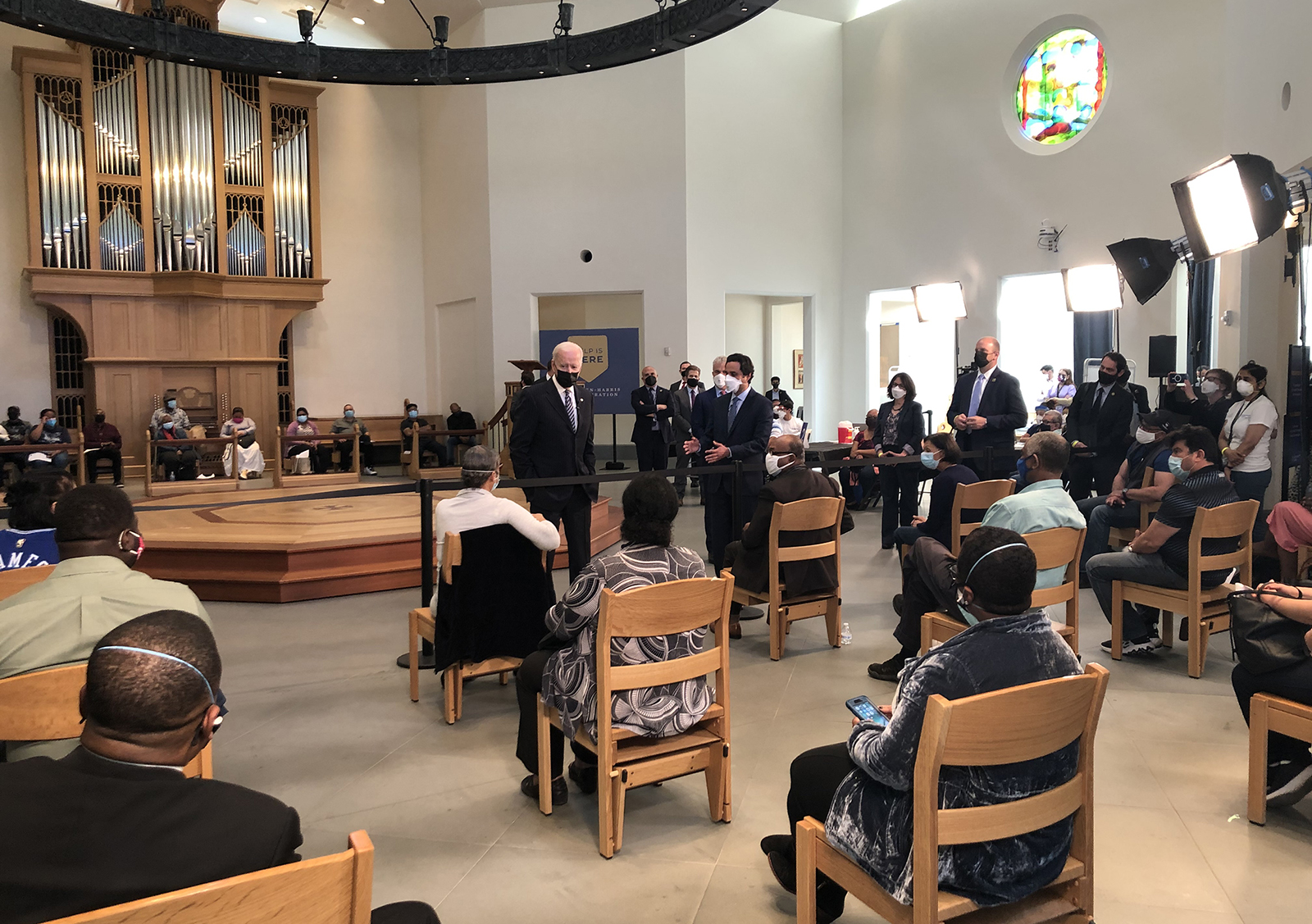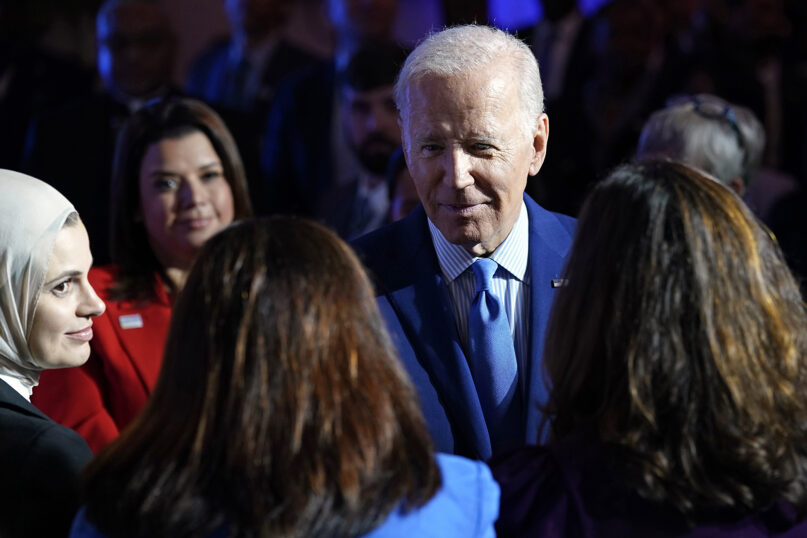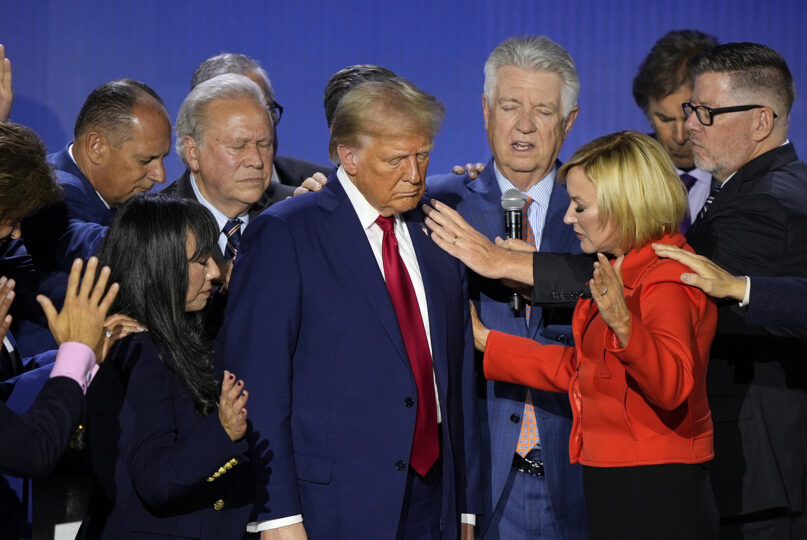
(RNS) — Among the achievements of the White House Office of Faith-Based and Neighborhood Partnerships during the Biden presidency, the fourth administration to have featured such an office, is its work with faith-based groups on the rapid distribution of COVID-19 vaccines and helping develop both an antisemitism and anti-Islamophobia strategy, even as a war in Gaza threatened interfaith relationships in the U.S.
Melissa Rogers, outgoing executive director of the White House Office of Faith-Based and Neighborhood Partnerships, which seeks to link governmental and religious partners to provide social services and address social ills, called the pandemic “a very big challenge that no one would have ever wanted to happen to our nation and world.” But she said her office’s work with American civic officials, both religious and secular, “writing the playbook as we worked with these organizations,” led to greater cooperation between the public and private sector on a number of issues.
“We were able to deepen and widen our work and accelerate our work with faith and community leaders to serve people in need all across the country and around the world,” said Rogers in an interview with RNS as she concluded her time leading the partnerships office for the second time, having also done so in the Obama administration.
Sometimes the office’s initiatives intersected with serious tensions, including with the Muslim American community over the administration’s support for Israel and its war in Gaza.
“There’s no question that the last year has been challenging, but we’ve been able to keep lines of communication (open) with many who parted ways with the administration on certain foreign policy issues,” Rogers said. Israel and Hamas were in the midst of a fragile ceasefire process as President Biden ended his term.
Though some Muslim leaders critiqued Biden’s anti-Islamophobia strategy as “too little, too late,” Rogers said the 67-page document seeks to bring attention to longtime discrimination against members of the Arab and Muslim communities in the workplace, housing and health care.
RELATED: Biden administration releases strategy for fighting Islamophobia

President Joe Biden greets people after speaking at the United We Stand Summit in the East Room of the White House in Washington, Thursday, Sept. 15, 2022. The summit was aimed at combating a spate of hate-fueled violence in the U.S., as he works to deliver on his campaign pledge to “heal the soul of the nation.” (AP Photo/Susan Walsh)
The document on Islamophobia, which was released a month before the end of the Biden administration, was modeled after a similar strategy to counter antisemitism that was released in 2023 and followed other anti-hatred efforts, such as the 2022 United We Stand summit. On that occasion, Rogers recalled, leaders from Jewish, Muslim, Sikh and Black Christian houses of worship that had been targeted in violent attacks “spoke out about not only their experience of those threats, but also the way in which they had worked with other faith leaders and other community leaders in the wake of these attacks to build solidarity — cross-community solidarity — against hate.”
The Biden administration also has extended the Nonprofit Security Grant Program, providing $400 million in funding in the most recent fiscal year for training and security improvements that have aided houses of worship, providing access and resources to a wider group of churches, gurdwaras and temples.
The office dates to 2001 when President George W. Bush announced its creation shortly after he became president.
Rogers said the Bush, Obama and Biden administrations, though each different in their specifics, agreed on “the understanding that a whole of government approach is necessary, but it’s not enough to solve our problems and move us forward.”
Former President Trump announced what he called the Faith and Opportunity Initiative in 2018, saying, “We know that in solving the many, many problems and our great challenges, faith is more powerful than government and nothing is more powerful than God.” He tapped his longtime adviser, Pentecostal preacher Paula White, to oversee that initiative in 2019, two years after his first presidency began.

President Joe Biden meets with advisers to prepare remarks he will deliver at the National Prayer Breakfast, Wednesday, February 1, 2023, in the Oval Office of the White House. Seated clockwise from the president are Domestic Policy Council Director Susan Rice, Melissa Rogers, director of Faith-Based and Neighborhood Partnerships and Director of Legislative Affairs Louisa Terrell. (Official White House Photo by Adam Schultz)
All four presidents have approved or maintained cabinet-level offices — such as in the Department of Agriculture, Health and Human Services and USAID — that do much of the legwork of the national office, partnering with community and faith groups to respond to natural disasters, promote religious freedom and improve energy efficiency of houses of worship and community centers.
Over the years, the White House Office of Faith-Based and Neighborhood Partnerships has played a key role in determining rules around services provided by faith-based groups and whether beneficiaries of federally funded social services can seek or be referred to an alternative service to avoid unwanted religious obligations — such as a Muslim or an LGBTQ+ atheist who is homeless and the federally funded shelter is Christian-run. The Trump administration removed such rules, and Biden has put them back.
Former staffers have voiced concern about the direction and focus of the faith-based partnerships office.
“If the initiative becomes just one more political lever that doesn’t really play a policy or social service role but really is about just one other way to offer political chips to supporters, not only will that be a political disaster, the damage it will do to the role of faith in America long after their term is over — that can be profound,” said Michael Wear, who worked in the office under the Obama administration, at a Monday (Jan. 13) forum in Washington about trends related to faith-based organizations.

Stanley Carlson-Thies. (Courtesy photo)
Stanley Carlson-Thies, who served on the first staff of what was called the White House Office of Faith-Based and Community Initiatives in the Bush administration, also expressed concern in a December article about a similar shift he’s observed over the years.
“(S)ome of the power of the initiative and its officials has been undermined as successive White Houses increasingly viewed the initiative more as a tool to gain the support of faith-based organizations for administration priorities,” he wrote, “rather than primarily as a way to support the work of those faith-based organizations.”
Asked for a response to Carlson-Thies’ comments, Rogers said the outgoing administration has endeavored to listen and not just talk to faith and other civic leaders with whom it has interacted.
“For example, when we worked with — and I traveled to — Buffalo and Uvalde in the wake of those shootings, we spent hours and hours listening to faith and community leaders about things that they needed and things that we could work with them to do based on their insight and knowledge of their community,” she said.
One result of those listening sessions, she said, was the new Office of Gun Violence Prevention, a first for a U.S. presidential administration.
What the partnerships office might look like and who will lead it in the coming months are mostly unknown, as well as whether the strategies of the current office will be adopted by the Trump administration.
But Trump has promised to reinstate his version of a White House faith office in his second term.

Republican presidential nominee former President Donald Trump is prayed over with Pastor Paula White, right, during the National Faith Summit at Worship With Wonders Church, Monday, Oct. 28, 2024, in Powder Springs, Ga. (AP Photo/Brynn Anderson)
Trump briefly discussed plans to bring back the initiative during a faith-themed campaign event in Powder Springs, Georgia, with White.
“It’s important,” he said, adding that the office would report “directly into the Oval Office — and me.”
Later at the event, White appeared to suggest that the new faith office will operate out of the White House itself.
Although Trump indicated he would be “talking” to White about the office, it’s unclear if she will lead the effort again in his second term. It also remains to be seen what tasks will be assigned to the new office, although Trump has said he wants to “save religion in our country.”
Even so, conservative Christian leaders have lauded the effort.
“President Trump will be adding a faith office in the White House that directly reports to him to protect and preserve the church,” Arizona Pastor Mark Driscoll posted on X after meeting with Trump backstage at the Powder Springs event.
Carlson-Thies, writing about his expectations for the continuing office, said he hopes Trump can “reset the federal faith-based initiative and reinvigorate it as a crucial means of redirecting the attention of government agencies from carrying out their own visions to protecting and supporting civil society’s good works.”
RELATED: Biden signs executive order reestablishing White House faith office
